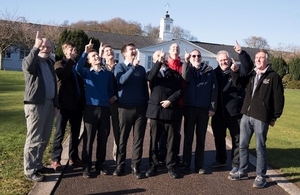Out-of-this-World! Citizen Science brings Astronomy Data to Dstl
The Defence Science and Technology Laboratory partners with an amateur astronomy society to track space debris

Members of Basingstoke Astronomical Society visit Dstl
A project designed to test equipment used within the amateur astronomer community to track space debris saw Defence scientists harnessing the talents of a local astronomy society.
Launched at the Defence Science and Technology Laboratory (Dstl), Project Argus brought Basingstoke Astronomical Society (BAS) members together with Dstl’s Space Programme to test readily-available astronomical equipment’s ability to see, catalogue and study space debris.
As the satellite population has grown, so has the risk of collisions involving communication, navigation or remote sensing satellites. Dstl has been working with the RemoveDebris consortium (part funded by the European Commission) to explore space debris disposal technologies using a special demonstrator satellite. The citizen science project observed several satellites including RemoveDebris.
A critical technical challenge of Space Situational Awareness (SSA) is the provision of accurately-timed satellite observations from geographically distributed sensor sites – without this, precise orbit determination is impossible. Commercially available software was found to be deficient and so the BAS team created their own techniques using a novel mix of hardware and software developed within the group. To enable the efficient processing of large quantities of BAS data, Dstl scientists developed automated image processing tools and in-house orbit estimation software. These developments will be exploited at our new research telescope facility “Holmes”, planned for construction at Portsdown West.
Mike O’Callaghan, Space programme manager from Dstl, said:
It’s been a fantastic example of harnessing the expertise of talented and committed individuals to real effect. We have all enjoyed working with Basingstoke Astronomical Society on Project Argus – they went above and beyond our expectations, I was amazed at how much they achieved following their recent visit to Dstl!
This productive partnership was key to bringing large volumes of data in and led to decisions which have advanced our programme.
Trevor Gainey, Chair of Basingstoke Astronomical Society, said:
When our Secretary Alan Lorrain invited Dstl to talk to us last February having seen an article in the Salisbury local press, we had no idea this would turn out to be the start of such an involved and enjoyable project. Our members have all been enthusiastic about addressing and solving some really interesting observing problems and working with Dstl staff to enable better knowledge of space debris.
The Argus experiment highlighted key considerations for future UK operational SSA systems, including identifying the capabilities and limitations of commercially available optical equipment to observe satellites. This will feed into advice provided by Dstl into national SSA enhancement programmes across both the military and civilian domains.